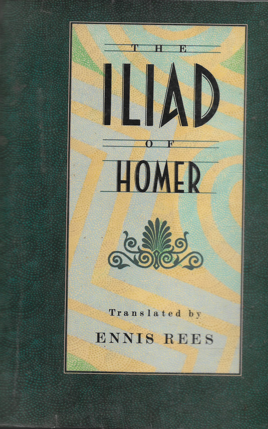Started: February 18, 2023 | Finished: February 29. 2024
The Iliad

Translated by Ennis Rees.
The foremost quality of this translation of “The Iliad” is its accessibility, the second is its power and beauty; a truly enjoyable experience.
This is the second time I am reviewing The Iliad, the first time was when I read the prose translation by Samuel Butler.
I had always believed that a verse translation of The Iliad would be too daunting for me but this book - which I bought a long time ago - came back into my possession, part of a large volume of books that was about to be given away by my Mom and which I recovered instead.
I read the first few lines and was quite surprised by how approachable it was - the verse immediately attracted me with its clarity and beauty. When I finished a couple of pages I had a sense of this version being better than the Samuel Butler prose version I had first read. I decided to test it out by rereading the equivalent scene in the Butler translation.
I was right.
This version by Ennis Rees has a power and beauty that, melded with its easy-to-read quality, had me deciding on doing a second reading of The Iliad.
This is a war after all and I felt one has to take sides. My side has always been the Trojan one; simply because I always tend to side with the underdogs. With this reading though, I thought about it again. Bottom line: It is the Trojans (spell that P-A-R-I-S) that were at fault. Paris stole the wife and goods of another man whom he visited as a guest. There is no getting out from that fault. And just like that I am now firmly on the side of the Argives.
Another thing I noticed this time around is that the big plot elements of The Iliad are dictated by Zeus - the whole story is the work of Zeus. No matter what the other gods do, or what the men do. Nothing. The will of Zeus is paramount. There was a section of the book when Zeus was pretty much saying this is what will happen, then this, then this. And that’s pretty much how it turns out.
There are also many instances when the heroes on both sides of the war get a sense of Zeus wanting an event to go this way or that. And when they sense this they back off. You simply don’t mess with the will of Zeus, and, to a lesser extent, with the will of the other gods.
I also notice, this time around, how deeply agricultural the world of the Iliad is. This is most evident when Homer uses metaphor, it is usually in the form of a reference to agriculture - the reference reveals what the men of the time are most familiar with. My mind imagines a pastoral world with only three main pursuits, planting, animal husbandry, and war.
With The Iliad one can also glean how the warriors stand relative to each other in terms of their fighting prowess. Achilles is the best, no surprise, Now here’s the surprise. Ajax, son of Telamon is second best and Hector is only third best. Read The Iliad, especially the two times when Ajax went against Hector, and you will see the greater Ajax as the superior fighter.
Speaking of fighters and fighting. I just noticed in this reading that Patroclus did not lose to anybody - he was assassinated by Apollo. What an eye-opener! Id din not notice that during my first reading.
As I read The Iliad, even when I was reading the Samuel Butler translation, my constant thought was: Why didn’t the Trojans just sacrifice that lusty idiot Paris. Just give him up and Helen and all the treasure plus some more. Why didn’t they just do it? I don't have the answer to that question.
Towards the end of the epic we are presented with the funeral games for Patroclus. During my reading of the Butler version I just read through this. This time around I really enjoyed reading about the event, with the chariot race being a particular favorite part.
So who is the character I most admire? Is it Achilles? Hector? Aeneas? Odysseus? The character I most admire is Echepolus. He is mentioned in the funeral games as an Argive, who - rather than join the war - just sent a valuable horse to Agamemnon in place of his participation. Draft dodger you say? Hell no, genius is what he is.
Another thing I found I liked in this Rees translation when compared to the Butler translation is the use of Greek names. I always found Butler’s decision to use Latin names to be unfortunate.
Long ago I read another version of the Iliad, I forgot who the translator was, and there were two phrases in that translation that I miss and which are not in this translation. The phrases: “rosy fingered dawn” and “the boon of sleep”.
I highly recommend the Ennis Rees translation of the Iliad. It is like this massive tapestry with sumptuous details everywhere you look.